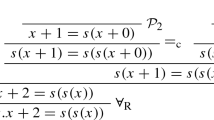Abstract
We modify the reflection method to enable it to deal with partial functions like division. The idea behind reflection is to program a tactic for a theorem prover not in the implementation language but in the object language of the theorem prover itself. The main ingredients of the reflection method are a syntactic encoding of a class of problems, an interpretation function (mapping the encoding to the problem) and a decision function, written on the encodings. Together with a correctness proof of the decision function, this gives a fast method for solving problems. The contribution of this work lies in the extension of the reflection method to deal with equations in algebraic structures where some functions may be partial. The primary example here is the theory of fields. For the reflection method, this yields the problem that the interpretation function is not total. In this paper we show how this can be overcome by defining the interpretation as a relation. We give the precise details, both in mathematical terms and in Coq syntax. It has been used to program our own tactic ‘Rational’, for verifying equations between field elements.
Access this chapter
Tax calculation will be finalised at checkout
Purchases are for personal use only
Preview
Unable to display preview. Download preview PDF.
Similar content being viewed by others
References
G. Barthe, M. Ruys and H. Barendregt (1996), A Two-Level Approach towards lean Proof-Checking.
S. Boutin, Using reflection to build efficient and certified decision procedures. In Martin Abadi and Takahashi Ito, editors, TACS’97, volume 1281. LNCS, Springer-Verlag, 1997.
G. Huet et al. (1997), The Coq Proof Assistant, Reference Manual, Version 6.1, INRIA-Rocquencourt — CNRS-ENS Lyon.
The Fundamental Theorem of Algebra Project, Departmet of Computer Science, University of Nijmegen, the Netherlands. See http://www.cs.kun.nl/gi/projects/fta/
J. Harrison (1995), Meta theory and Reflection in Theorem Proving: a Survey and Critique, Technical Report CRC-053, SRI International Cambridge Computer Science Research Center.
D. Howe (1988) Computational Meta theory in Nuprl, The Proceedings of the Ninth International Conference of Automated Deduction, eds. E. Lusk and R. Overbeek, LNCS 310, pp. 238–257.
M. Oostdijk and H. Geuvers (2000), Proof by Computation in Coq, to appear in TCS.
Author information
Authors and Affiliations
Editor information
Editors and Affiliations
Rights and permissions
Copyright information
© 2000 Springer-Verlag Berlin Heidelberg
About this paper
Cite this paper
Geuvers, H., Wiedijk, F., Zwanenburg, J. (2000). Equational Reasoning via Partial Reflection. In: Aagaard, M., Harrison, J. (eds) Theorem Proving in Higher Order Logics. TPHOLs 2000. Lecture Notes in Computer Science, vol 1869. Springer, Berlin, Heidelberg. https://doi.org/10.1007/3-540-44659-1_11
Download citation
DOI: https://doi.org/10.1007/3-540-44659-1_11
Publisher Name: Springer, Berlin, Heidelberg
Print ISBN: 978-3-540-67863-2
Online ISBN: 978-3-540-44659-0
eBook Packages: Springer Book Archive




